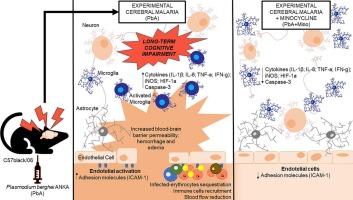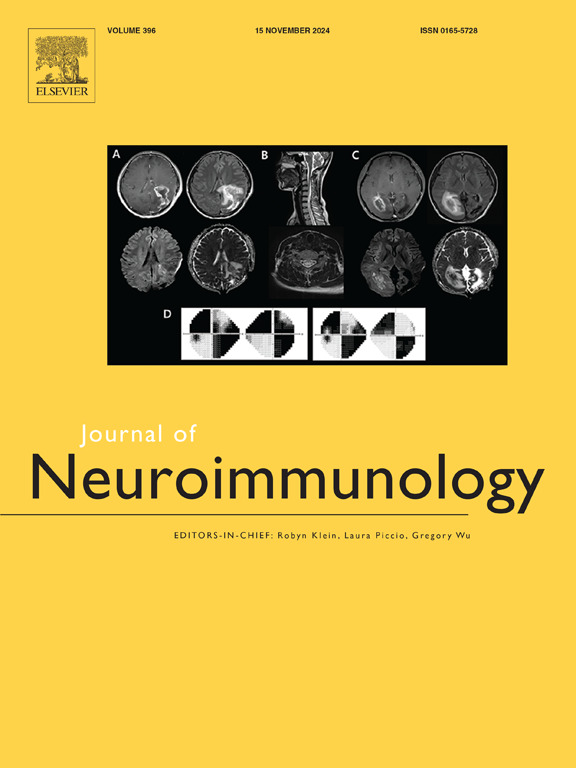米诺环素可抑制 CA1 海马区的小胶质细胞活化并预防实验性脑疟疾后的长期认知后遗症
IF 2.9
4区 医学
Q3 IMMUNOLOGY
引用次数: 0
摘要
脑疟疾是疟疾感染最严重的并发症,死亡率很高,并可能导致不同的神经功能障碍,包括认知能力下降。神经炎症是神经退行性疾病中认知损伤的重要原因,小胶质细胞可在疾病相关的情况下被激活,导致组织损伤和神经元死亡。在这里,我们证明了米诺环素治疗可减少血脑屏障的破坏并调节ICAM1 mRNA的表达;减少促炎细胞因子,如TNF-α、IL-1β、IFN-γ和IL-6;以及防止情境记忆和厌恶记忆任务中的长期认知能力下降。总之,我们的数据表明,小胶质细胞在实验性脑疟疾期间被激活,导致神经炎症事件,最终造成认知损伤。此外,米诺环素等药物对小胶质细胞活化的药理调节可能是预防长期记忆损伤的重要治疗策略。本文章由计算机程序翻译,如有差异,请以英文原文为准。

Minocycline inhibits microglial activation in the CA1 hippocampal region and prevents long-term cognitive sequel after experimental cerebral malaria
Cerebral malaria is the worst complication of malaria infection, has a high mortality rate, and may cause different neurodysfunctions, including cognitive decline. Neuroinflammation is an important cause of cognitive damage in neurodegenerative diseases, and microglial cells can be activated in a disease-associated profile leading to tissue damage and neuronal death. Here, we demonstrated that treatment with minocycline reduced blood-brain barrier breakdown and modulated ICAM1 mRNA expression; reduced proinflammatory cytokines, such as TNF-α, IL-1β, IFN-γ, and IL-6; and prevented long-term cognitive decline in contextual and aversive memory tasks. Taken together, our data suggest that microglial cells are activated during experimental cerebral malaria, leading to neuroinflammatory events that end up in cognitive damage. In addition, pharmacological modulation of microglial activation, by drugs such as minocycline may be an important therapeutic strategy in the prevention of long-term memory impairment.
求助全文
通过发布文献求助,成功后即可免费获取论文全文。
去求助
来源期刊

Journal of neuroimmunology
医学-免疫学
CiteScore
6.10
自引率
3.00%
发文量
154
审稿时长
37 days
期刊介绍:
The Journal of Neuroimmunology affords a forum for the publication of works applying immunologic methodology to the furtherance of the neurological sciences. Studies on all branches of the neurosciences, particularly fundamental and applied neurobiology, neurology, neuropathology, neurochemistry, neurovirology, neuroendocrinology, neuromuscular research, neuropharmacology and psychology, which involve either immunologic methodology (e.g. immunocytochemistry) or fundamental immunology (e.g. antibody and lymphocyte assays), are considered for publication.
 求助内容:
求助内容: 应助结果提醒方式:
应助结果提醒方式:


